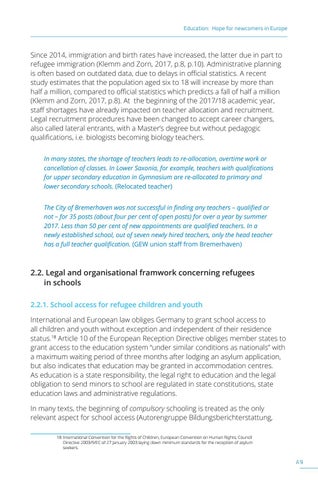Education: Hope for newcomers in Europe
Since 2014, immigration and birth rates have increased, the latter due in part to refugee immigration (Klemm and Zorn, 2017, p.8, p.10). Administrative planning is often based on outdated data, due to delays in official statistics. A recent study estimates that the population aged six to 18 will increase by more than half a million, compared to official statistics which predicts a fall of half a million (Klemm and Zorn, 2017, p.8). At the beginning of the 2017/18 academic year, staff shortages have already impacted on teacher allocation and recruitment. Legal recruitment procedures have been changed to accept career changers, also called lateral entrants, with a Master’s degree but without pedagogic qualifications, i.e. biologists becoming biology teachers. In many states, the shortage of teachers leads to re-allocation, overtime work or cancellation of classes. In Lower Saxonia, for example, teachers with qualifications for upper secondary education in Gymnasium are re-allocated to primary and lower secondary schools. (Relocated teacher) The City of Bremerhaven was not successful in finding any teachers – qualified or not – for 35 posts (about four per cent of open posts) for over a year by summer 2017. Less than 50 per cent of new appointments are qualified teachers. In a newly established school, out of seven newly hired teachers, only the head teacher has a full teacher qualification. (GEW union staff from Bremerhaven)
2.2. Legal and organisational framwork concerning refugees in schools
2.2.1. School access for refugee children and youth International and European law obliges Germany to grant school access to all children and youth without exception and independent of their residence status.18 Article 10 of the European Reception Directive obliges member states to grant access to the education system “under similar conditions as nationals” with a maximum waiting period of three months after lodging an asylum application, but also indicates that education may be granted in accommodation centres. As education is a state responsibility, the legal right to education and the legal obligation to send minors to school are regulated in state constitutions, state education laws and administrative regulations. In many texts, the beginning of compulsory schooling is treated as the only relevant aspect for school access (Autorengruppe Bildungsberichterstattung, 18 International Convention for the Rights of Children, European Convention on Human Rights; Council Directive 2003/9/EC of 27 January 2003 laying down minimum standards for the reception of asylum seekers.
A9
